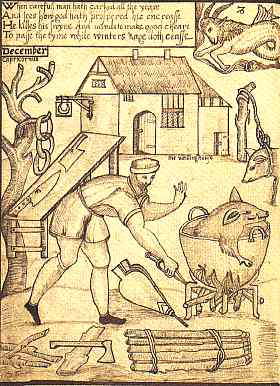Winter
Even in the best of seasons, the farmer could not keep all his livestock in the winter-- there was simply not enough food for them. Necessity thus dictated that the days of late November were full of feasting.
Extra meat was sold at the market, or was preserved in salt for later in the winter.
At Hallowtide*, slaughter-time entereth in,
And then doth the husbandman's feasting begin.
From thence until Shrovetide*, kill now and the some,
Their offal for household the better will come.
Winter was a time to clean the privies*, bewail the winter wind* and all it symbolized, and eat the soup prepared by Greasy Joan.*
Footnotes
-
Thomas Tusser on privies
Foul privies are now to be cleansed and fied [refined],
Let night be appointed, such baggage to hide;
Which buried in garden, in trenches a-low,
Shall make very many things better to grow.
Ere Christmas be passed, let horse be let blood,
For many a purpose, it doth them much good. -
Winter wind
Blow, blow, thou winter wind,
Thou art not so unkind
As man's ingratitude:
Thy tooth is not so keen,
Because thou art not seen,
Although thy breath be rude.
Heigh-ho, sing heigh-ho, unto the green holly.
Most friendship is feigning, most
loving mere folly.
Then heigh-ho, the holly,
This life is most jolly."
(As You Like It, 2.7.173-82) -
Greasy Joan?
This companion to the song of Spring from Love's Labour's Lost is unexpectedly cheerful:
[Winter]: When icicles hang by the wall,
And Dick the shepherd blows his nail,
And Tom bears logs into the hall,
And milk comes frozen home in pail,
When blood is nipped, and ways be foul,
Then nightly sings the staring owl, "Tu-whit,
Tu-who!" a merry note,
While greasy Joan doth keel [skim] the pot.
When all aloud the wind doth blow,
And coughing drowns the parson's saw [sermon],
And birds sit brooding in the snow,
And Marian's nose looks red and raw,
When roasted crabs [crab-apples] hiss in the bowl,
Then nightly sings the staring owl, "Tu-whit,
Tu-who!" a merry note,
While greasy Joan doth keel the pot.
(Love's Labour's Lost, 5.2.908-25) -
Glossary
- Hallowtide
- All Saints Day: the first of November and the week following.
- Shrovetide
- The festive days before, and including, Shrove Tuesday--the day before Ash Wednesday, when Lent begins.
